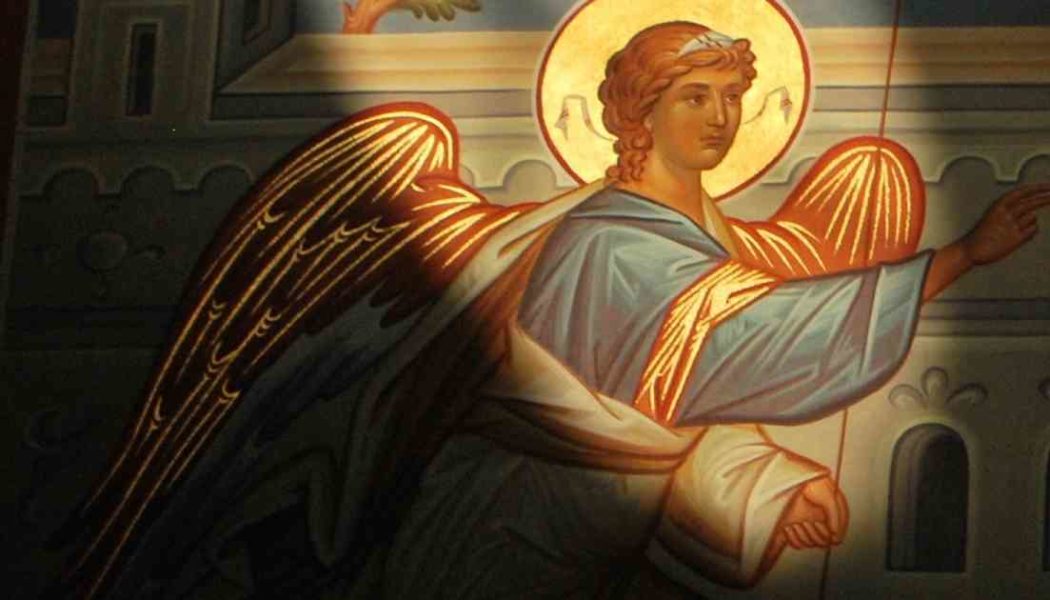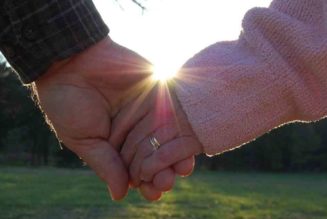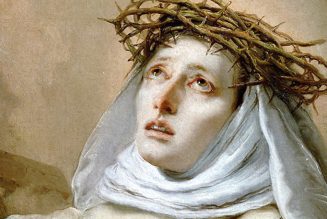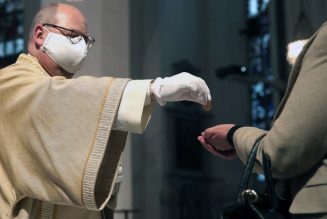
We tend to make a few basic mistakes about Christ in our lives. This Sunday, by celebrating the Fourth Sunday of Advent on Christmas Eve, we have a great chance to correct them.
We see these mistakes in our personal spiritual lives, our attitudes toward politics, our attitude toward our families, and our attitude the Church — especially when we don’t understand or disagree with the Church, as happened this week on a worldwide scale over the matter of blessing couples.
Sunday’s Gospel breaks into our lives like an unexpected angel.
It feels like Christmas already — and yet at Mass we light yet another purple candle and the Gospel gives us the angel Gabriel on March 25, not the host of angels on Dec. 25.
That can help, actually. We can be as surprised by the angel as Mary was when Gabriel invaded her life and said “Hail, full of grace! The Lord is with you.”
She was greatly troubled at this, and we should be too. Angels are always terrifying in the Bible, because they bring heaven with them. Heaven has an austere finality which is entirely other from our transient existence. We always want to give ourselves wiggle room; angels are fully in the presence of God and his uncompromising holiness.
God does for us this Sunday what he does for Mary at the Annunciation. His messenger invades our life saying:
“The Holy Spirit will come upon you,
and the power of the Most High will overshadow you.
Therefore the child to be born
will be called holy, the Son of God.”
With that, Gabriel reveals to Mary the Trinity, God Father, Son and Holy Spirit. But he starts with the Holy Spirit, and so shall we …
Because our first mistake about Christmas is David’s mistake: We tell Jesus we will make a place for him.
King David addresses Nathan the prophet in the First Reading and says he wants to build a house for God, whose ark had no Temple yet. But that night Nathan hears from God, who has different plans: It’s God who will establish a house and kingdom for David, not the other way around.
We make the same mistake when we decide that we will do Jesus a favor and make a place for him in our hearts. As sincere and good-natured as that resolution may be, when St. Paul tells the Corinthians that “your body is a temple of the Holy Spirit within you,” he adds, “you are not your own.”
So Gabriel’s “The Holy Spirit will come upon you,” applies to us, as well. At Baptism, the Holy Spirit came upon you for the first time, changing your very identity and bringing his seven gifts which help you evaluate and interact with the world from his point of view: His Wisdom can give you his sight and his Understanding can give you his insight. His Knowledge can tell you what to say, his Right Judgement can show you what to do — and his Fortitude can give you the strength for both. His Piety can give you the boldness to approach him while his Fear of the Lord reminds you of your littleness.
So, enter into the room he has prepared for you this Christmas, and stop trying to fit him into your small space.
Our second mistake about Christmas is one the Psalms struggled with: We expect God to conquer in our way and our time.
The angel told Mary that her child will be great, the “son of the Most High,” and “the Lord God will give him the throne of David his father, and he will rule over the house of Jacob forever, and of his kingdom there will be no end.”
This Sunday, Psalm 89 spells out what Gabriel is announcing: “I have sworn to David my servant: I will establish your descendants forever, and set up your throne through all ages.”
The full Psalm goes on to to expresses how perplexing it was to the Jewish people that this covenant with David didn’t seem to have been kept, crying out in exasperation: “How long, O Lord? Will you hide yourself forever?” We make the same mistake when we look at the world with disappointment at God’s absence in our politics, and wonder why he has abandoned us.
But the Psalm also sees the answer: “The heavens are yours, the earth is yours … it is you who created the North and the South.” The fact is, the universe is God’s, and we are powerless against its unchangeable laws. The Book of Nature tells us every day what Gabriel tells Mary: “The power of the Most high will overshadow you.” And we respond every day with the Our Father, saying “Hallowed be thy name,” and asking for his kingdom to come, for his will to be done, and his daily sustenance.
Politics is important, but ultimately we rely on his will in his time to wield his power, and echo Mary’s “Let it be done according to thy word.”
Which brings us to the next mistake we make: We think that our primary family is the one who shares our address.
When Gabriel tells Mary about the child she will have, she asks, “How can this be, since I have no relations with a man?”
This is odd, since the passage starts out by identifying her as “a virgin betrothed to a man named Joseph, of the house of David.” Wouldn’t she assume that this child of David would be Joseph’s biological son? She would, unless she has taken a vow of virginity that she intends to keep.
Instead, she is told that the child will come to her miraculously: “The child to be born will be called holy, the Son of God.”
We have to be told the same thing: that Our Father will act in our lives not according to our relationships and plans, but according to his relationships and plans. Our Father doesn’t join our family — we have to join Our Father’s.
This is fundamental to Christianity, says the Catechism. “Becoming a disciple of Jesus means accepting the invitation to belong to God’s family, to live in conformity with his way of life: ‘For whoever does the will of my Father in heaven is my brother, and sister, and mother.”
If God’s family and our family are at odds, it’s our family that has to give way. God’s kingdom is fundamental. And that’s where we get the headlines of the past week.
The final mistake we make about Christ in our lives is thinking that we are here to save the Church, not vice versa.
Mary is told she will bring the reign of David and the Son of God. Those two things, the Kingdom and the Body of Christ, are shorthand for the Church.
The Church, invisibly, is both “the family of God” (Catechism No. 759) and “the Reign of Christ already present (No. 763). The visible Church — with its buildings and hierarchy — is both “the house of God in which his family dwells” (No. 756) and “a structure that will remain until the Kingdom is fully achieved” (No. 765).
Mary calls herself “the handmaid of the Lord” to acknowledging that her place in the Kingdom is subservient. We are in her position, only more so: We lay people are handmaids of the Lord, recipients of the Church’s wisdom, not its interpreters. I am a janitor in the Church. I don’t sit in the board room, though I do my best to clean up any messes I see when the meetings are done.
Too often, though, we think we are in control, and can pick and choose what we accept from the Church. We don’t say “I am the handmaiden … let it be done;” we say “I know better … let this not be done.”
The way many Catholics received Fiducia Supplicans, the Vatican document on blessings, is a great example.
If I were pope, I never would have okayed it, and if I were a bishop, I would probably respond like the Milawi bishops. But I’m not the pope and I’m not a bishop, so I will attempt some clean-up instead.
The Vatican clearly intends the document to tell Catholics to be more welcoming to people in same-sex relationships with an eye to bringing them to the fullness of Christian truth.
We already do this with sexual sinners of other kinds — for instance, we tolerate and bless couples who routinely sterilize their sexual activity with contraception, deliberately blocking God’s will from their lives for decades, in direct opposition to the Church. It is, in fact, the widespread acceptance of contraceptive sexual acts that led to the widespread acceptance of homosexual sex acts in the first place. Contraceptives transformed sex from being unitive and procreative to being merely romantic and pleasurable. Homosexual sex can fulfill both of those criteria.
The document reminds us that we should not accept one group of sinners one way, and another group of sinners another way. It insists that the only permissible sexual union is marriage, the “exclusive, stable, and indissoluble union between a man and a woman, naturally open to the generation of children,” adding, “The Church’s doctrine on this point remains firm” (No. 4).
For that reason, it says, “one should neither provide for nor promote a ritual for the blessings of couples in an irregular situation. At the same time, one should not prevent or prohibit the Church’s closeness to people in every situation in which they might seek God’s help through a simple blessing” (No. 38). The Vatican allows for a “spontaneous blessing” that asks “God’s light and strength to be able to fulfill his will completely,” but rejects “any form of confusion or scandal” by looking like a blessing of a union comparable to marriage (No. 30).
Self-identified “liberal” Catholics understood well that the Church was signaling its welcome to persons with same-sex attraction — but they ignored that the Church wanted to draw them to holiness by correcting their sexual sins, never condoning them. One priest directly caused “confusion and scandal” by staging a liturgical-looking blessing for New York Times photographers.
That reaction says “I know better than the Church; I am here to correct the Church because I have the guts to do what the Vatican really should have done.”
Self-identified “conservative” Catholics did the opposite. They understood well that the Church doesn’t condone same-sex sexual relationships, but refused to look for any way to be more welcoming to people in those relationships, as the Church is clearly asking. They simply rejected the whole document out of hand and denounced the pope publicly, and harshly.
That reaction also says, “I know better than the Church; I am here to correct the Church, because I have the guts to say what the Vatican really should have said.”
This is the kind of self-centered approach that the Fourth Sunday of Advent is meant to correct.
Mary put aside her preconceptions about how her life will work, how God’s power will be manifest, and how her family would develop, and she changed history.
We also await the Son of God in our lives, the one who can restore our lost innocence, the one who alone can give us peace, the one who constitutes our holiness.
He doesn’t want us to change in order to make some room for him, he wants to us to change so that we can occupy the room he made for us.
If we do, our humility, obedience and docility will go a long way toward bringing to earth the Kingdom where his will — not ours — is done.
Image: Ted, Flickr, Gabriel









![New Survey Shows Surprising Curiosity About Faith Among Young People [WSJ Paywall]…](https://salvationprosperity.net/wp-content/uploads/2023/04/new-survey-shows-surprising-curiosity-about-faith-among-young-people-wsj-paywall-327x219.jpg)